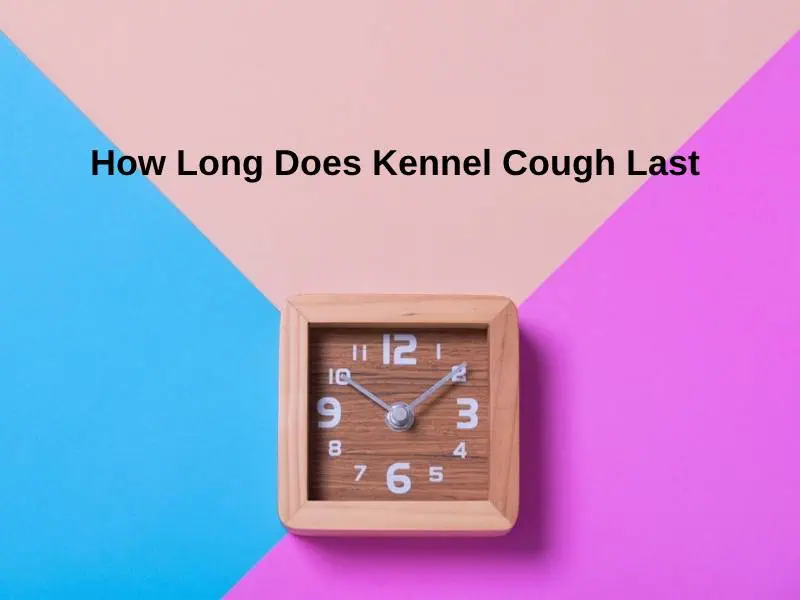Exact Answer: 1 to 3 weeks
Kennel cough, also scientifically known as canine infectious trachea bronchitis, is a highly contagious disease that can be caused by several factors. It results in a persistent cough that is accompanied by several other symptoms. The ailment causes inflammation of the canine throat, airways, and lungs.
The common pathogens causing the disease are bacteria and viruses. Although it is contagious, it is not lethal and can be treated with proper medication and care. The pathogens infect those canines with low immunity, such as puppies, elderly dogs, or canines with compromised immune systems.

How Long Does Kennel Cough Last?
Kennel Cough lasts for 1 to 3 weeks but can extend up to 6 weeks, if the ailment is accompanied by other diseases leading to pneumonia. The parainfluenza virus and the Bordetella bronchiseptica bacteria are the main causative agents. The virus causes a mild case of kennel cough that can been treated within a week.
On the other hand, the bacteria causes a more serious case that needs up to 10 days of medication to be cured. There are cases when both the virus and bacteria can infect a canine leading to a more severe ailment that requires at least 15-20 days of medical attention. There are several symptoms of Kennel cough that may affect canines:
- Sneezing
- Runny nose
- Eye discharge
- Fever
- Loss of appetite
- Cough
- Fatigue
A dog first contracts the viral infection and later the bacterial infection as the secondary illness. Both infections require different treatments. The parainfluenza viral infection has a vaccination as a preventive measure, but the bacterial infection has no such measure.
The Bordetella infection can be treated with antibiotics and the persistent cough with suppressants. Doctors also prescribe vitamins and other supplements to induce better canine immune reactions. In mild cases, medication is not required as the immune system can tackle it with antibodies, however, seeking medical help can be a precautionary measure against the illness.
In summary:
| Infection | Recovery Time |
| Parainfluenza viral | 6-7 days |
| Bordetella bacterial | 10 days |
| Both viral and bacterial | 15-20 days |
Why Does Kennel Cough Last So Long?
The overall health of a dog and other factors determine the recovery time for Kennel cough. Young adult dogs recover faster because of an active and healthy lifestyle, leading to a strong immune system. Puppies and elderly dogs are more susceptible to the disease and may take a longer healing time.
The immune system of puppies is still in a developing stage, which makes them an easy target for the causative agents. Elderly dogs have weakened immunity because of which they have higher chances of developing severe cases of Kennel cough paired with other diseases. If a canine has been infected with the disease multiple times, there are more chances of rapid recovery.
Kennel cough is contagious because of which it is recommended to isolate the infected canines for at least a week or two until some of the symptoms disappear. Viral infection can be cured soon because of the presence of vaccines and proper medication. Any canine can be jabbed with the Parainfluenza vaccine every six months or annually.
Bordetella infections are serious and cause many symptoms which may last for up to six weeks even after recovery. Prolonged cases of the illness may ultimately lead to pneumonia and other respiratory complications. One can use humidifiers to help a canine recover faster.
Conclusion
Kennel cough is a respiratory disease in canines that leads to persistent cough and other symptoms such as fever, eye discharge, fatigue, etc. It takes up to 1 to 3 weeks of recovery time, however, symptoms may also last up to 6 weeks in prolonged severe cases. The illness does not require medical treatment in mild viral infection, but medical help is needed in case of more serious bacterial infection.
Preventive measures such as isolation in the early stage of the disease, use of humidifiers, avoiding smoke and polluted air, proper medication, and vaccination are recommended.